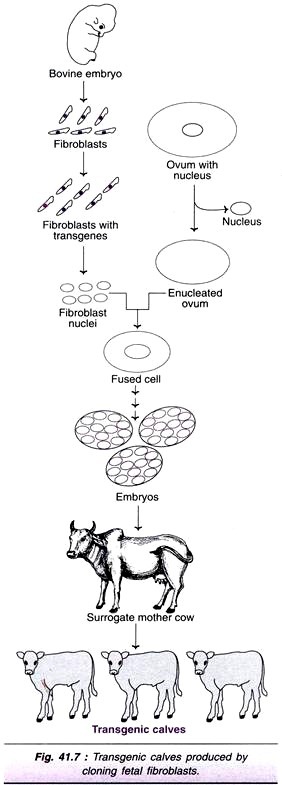Read this article to learn how the transgenic animals are produced by cloning fetal cells.
Fetal cells such as fibroblasts are totipotent. Fetal cell cloning was successfully carried out by some workers to produce transgenic sheep (Polly), transgenic bull calf (Gene) and other animals.
Transgenes (foreign genes) can be inserted into the fetal cell genomes to produce desired products by transgenic animals.
As an example, the development of transgenic calves produced by cloning with fetal cells is shown in Fig. 41.7. Fibroblasts were collected from a fifty five day old bovine fetus. These fibroblasts with totipotent character are cultivated in a nutritious medium. The desired foreign genes (transgenes) can be introduced into fibroblasts.
The nucleus with the genetically altered DNA (fibroblast nucleus) is removed from the cell. It is then inserted into a bovine enucleated ovum. This ovum cell multiplies to form embryos. They are implanted in a surrogate (foster) mother cow to give birth to transgenic calves.
The calves represent clones, since they have originated from a single cell. They are transgenic as they carry the transgenes (foreign genes). The production of transgenic calves is a good example of nuclear transfer technology.
Introduction of foreign genes can be effectively carried out in fetal cells, and the so produced transgenic animals can serve as good animal bioreactors to synthesize several products of pharmaceutical importance. The progress in this direction has been rather slow due to ethical and moral issues.
